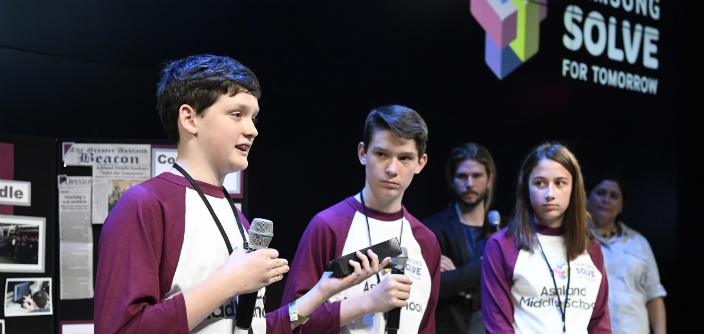Three Schools Named National Winners in the Samsung Solve for Tomorrow Contest for Using STEAM to Address the Opioid Epidemic, Concussion Detection and Natural Disasters
USA on April 11, 2018
Samsung awards schools from Kentucky, New Jersey and North Carolina with $150,000* in technology
With months of ideation, research, creation and pitching behind them, three schools have been named national winners in the $2 million* Samsung Solve for Tomorrow Contest from Samsung Electronics America, Inc. – a nationwide competition that challenges 6th through 12th graders to use STEAM (science, technology, engineering, arts and math) to address real-world issues and inspire change in their local communities.
The winning schools of Ashland Middle School in Ashland, Ky., Cavallini Middle School in Upper Saddle River, N.J. and Thomas Jefferson Middle School in Winston-Salem, N.C. provided unique solutions to critical issues affecting our nation – opioid addiction, sports concussion detection and natural disasters. These schools were chosen as the three national grand prize winners after pitching their projects to a panel of judges in New York City. These students and teachers succeeded through intense rounds of the contest, winning hundreds of thousands in technology along the way. First selected as one of 255 state finalists (5 per state) in November, then one of 51 state winners (including Washington, D.C.) in December, and then one of 10 national finalists in March, these three schools ultimately progressed to achieve the title of 2018 national grand prize winners.
“Each year that passes with the Samsung Solve for Tomorrow Contest, we are more impressed and awe-struck with the creative, strategic talent that our students and teachers possess,” said Ann Woo, Senior Director of Corporate Citizenship, Samsung Electronics America. “Our hope has always been to inspire confidence in today’s youth and provide the tools they need to pursue a career in STEAM. The national winners this year are testament to the possibility and promise of the next generation to answer some of today’s real issues. We are proud to bring awareness to their inspiring work.”
The Samsung Solve for Tomorrow Contest was created in 2010 to encourage innovation while addressing the technology gap in classrooms across the country. Each year, the competition inspires more active, hands-on teaching and learning among schools nationwide. Since 2001, Samsung has provided more than $60 million in technology to public schools in the United States. Over the past eight years, Samsung has received more than 17,000 entries for the competition, empowering youth to problem-solve and create with the support of their teachers, peers, schools and communities at-large.
The three national winners will receive $150,000* in Samsung technology products such as LED TVs, laptops and tablets for use in the classroom. This year’s winners include:
Ashland Middle School in Ashland, Ky.
Because local first responders called to the scene of a drug overdose are only armed with rubber gloves and tongs, the students of Ashland Middle School developed a solution to safely pick up and dispose of hypodermic needles. The students created a device that could be used by first responders and local authorities to pick up dangerous used needles and other drug paraphernalia.
“Technology is a great tool, but if you’re not using it to help people, it’s just a toy,” said Isaac Campbell, a student from the Ashland Middle School team.
View their project video here:
Cavallini Middle School in Upper Saddle River, N.J.
Reported concussions reached upwards of 3 million in 2017, and it’s estimated that half of all concussions are unreported or undetected. After a classmate suffered a concussion during football season last year, students at Cavallini Middle school developed sensors to be worn on football helmets to accurately and quickly identify potential concussions and help prevent any further brain damage through early detection.
“Our sensor, powered by a lithium-ion battery, uses two accelerometers along with a processor to calculate concussions through hits to the body. This data is collected in the app and sent to the coach on the sidelines,” explained Jake Carlin, a student from the Cavallini Middle School team.
View their project video here:
Thomas Jefferson Middle School in Winston-Salem, N.C.
After learning that strong summer storms are the primary cause of flooding in the U.S., Thomas Jefferson Middle School students developed a water sensor system that deploys water barriers when rising water levels reach 6 inches.
“Our Assistant Fire Chief let us know that, sadly, many communities do not have enough barriers to cover their flood prone zones, so they have to send out first responders to close streets when they should be out saving lives,” said Jake Gruver, a student from the Thomas Jefferson Middle School team.
Once the barriers are deployed, the system uses Wi-Fi to send a signal to emergency personnel. The information is then sent to the mobile map app, Waze, and the North Carolina Department of Transportation to alert drivers of the conditions.
View their project video here:
To learn more about the contest and the 2018 Top 10 national finalists, please visit: www.samsung.com/solve and smsng.news/SFT2018Top10.
*Estimated Retail Value
